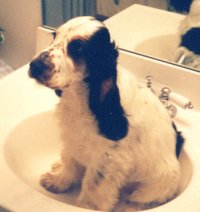|
Frequently Asked
Questions |
|
Things you'd
really like to ask, but ......
This page of FAQ's will answer the following
questions:
|
| Q: How
often should my dog be bathed?
Q: How often will I have to groom my
English Cocker? Can I groom him myself or will I need to hire
a groomer?
Q: Are English Cockers good dogs for
families with small children?
Q: Why should I spay/neuter my
pet?
Q: Is a fence really necessary for an
older dog that "Knows where home is"?
Q: Are electric fences a good alternative
to regular fencing?
|

Wendell & Twinkle
Land
|
|
|
Q: Is it OK if my dog sleeps in my bed
at night?
Q: What are the best toys for my
dog?
Q: What is the safest chew toy for my
dog?
Q: How often should my pet be
vaccinated?
Q: Is obedience school necessary just for
a good family pet?
Q: Isn't it a good idea for a dog to have
one litter of puppies before she's spayed?
Q: My dog's breath is really bad, what
causes it?
|
|

|
|

'Andy' - Grady
|
Q: How often
should my dog be bathed?
This usually depends on several factors,
the foremost of which is probably how much the "doggy" odor bothers you.
Color plays a factor since a dark colored dog living in the house and
going out on a grassy yard does not soon look dirty while a light colored
dog playing on mostly bare dirt soon looks grimy. The correct answer
is when you feel he needs it and you have the time. |
| Dogs being prepared for
show are often bathed weekly as that seems to encourage the hair to grow,
but sometimes it is hard to find the time. Once a month is probably a good
minimum with perhaps a good brushing every other week, paying special
attention to his arm pits and loin area. Remember to brush before the
bath, not after, as water tends to tighten mats and tangles. How often you
are planning on bathing will also determine what type of shampoo you use.
The more often you bathe the more carefully you should choose your
shampoo. Frequent shampooing requires a quality, made for dogs shampoo
which will not strip the oil out of the coat. |
|

|
Q: How often
will I have to groom my English Cocker? Can I groom him myself, or
will I need to hire a groomer?
Grooming the pet English cocker
usually consists of shortening the hair on his face, neck, feet, and back.
The amount of unruly hair and how fast it grows will determine how often
he will need grooming. Some people prefer a more tailored look, which will
require more frequent attention, while others like a more natural
look. If you have time it is fairly easy to learn to groom him
yourself with a minimum of equipment-- just don't expect
perfect results |

Gracie & Rachel - Land
|
| the first time. Some pet owners love grooming their dog, while others find it quite a task.
In
general about every eight to ten weeks works for most dogs, but nails
should be done weekly. The more often they are trimmed the less chance you
will have of cutting one too close. |
|
 |
|

Molly & pups - Paddock
|
Q: Isn't it a
good idea for a dog to have one litter of puppies before she's
spayed?
There is no advantage in having a litter of
puppies, plus you lose a great deal of the health benefits of having
your female spayed.
Q: Why should I spay/neuter my pet? Unless you are planning on becoming a serious breeder, altering
your pet is just plain practical.
|
| With
females you no longer have the problem of keeping her confined every six
months, and if done early before she ever comes in season, spaying
practically guarantees she will not get mammary cancer.
Neutered males are much less apt to forget their house training and are
not as apt to be territorial. They are also not bothered by neighboring
females that have not been spayed. Too, most municipalities that license
dogs give a large discount for altered pets. If you are thinking of
"just one litter" remember that raising a litter is very hard work.
Contrary to popular belief, the mother does not do all the work!! Too
there is always a chance you will lose the mother. If you think you might
want to breed Fido to get another "just like him" remember the puppies
temperament is more influenced by the mother. Another puppy raised in the
same atmosphere will probably pick up the same habits as the old dog
whether actually related or not. |
|

|
Q: Are
English Cockers good dogs for families with small children?
In
general they do very well with children. They are a moderate size that can
withstand children without overwhelming them and have a easy going,
tolerant nature that takes many things in stride. Parents should remember
that there are limits to what any dog can endure and oversee the
activities of small children. |

Raven's pups - Minor
|
| A puppy is NOT a warm
version of a stuffed toy. If treated roughly enough it will
eventually try to warn the child to cease by growling or as a last resort
nipping. Puppies also have to have periods of rest which children
sometimes find hard to understand. Very young children and very young dogs
both take a lot of time and most people would probably do better with just
one or the other. If you have a baby now, wait a while before getting a
puppy. The dog will be just as devoted as if they "grew up"
together. See our page on "Kids and Pups" for further
information. |
|

|
|

'Sophie' - Deyette
|
Q: Is a fence really necessary for an older dog that
"knows where home is"?
As much as keeping your dog in, a fence
keeps other things out, such as other dogs that may be aggressive or
people unknown to you who may be afraid of |
your dog or play too
rough. It keeps your dog out of traffic which is probably the number one
hazard to dogs today. Even if your dog is traffic-wise a moment's
distraction caused by a squirrel or a cat can have disastrous
consequences. Too, a loose dog is often perceived as abandoned and may be
carried off by some well meaning , or not so well meaning, fellow dog
lover. Trying to figure out why your dog did not come home one night
is very unpleasant and easily remedied with a
fence.
Q: Are electric fences a
good alternative to regular fencing?
An electronic fence is much
better than no fence since it will keep your pet out of the road and
confined to your own property, but it does not keep other things away from
your pet. If your dog should find something so fascinating outside
the fence that the appeal is worth the shock, history has proven they will
seldom go back through it. |
|
|

|
Q: Is it OK if my dog
sleeps in my bed at night?
If both of you can sleep comfortably
there is nothing wrong with a totally house trained dog sleeping on your
bed. If he gets up and down all night, crowds you from the center, shoves
you with his feet, |

'Molly' - Minor
|
| snores in your ear, or omits noxious
gases he might rest better in a crate. This is a big plus in case of an
emergency in the night as you know exactly where he is. |
|
|

|
|

'Jasper' - Savoy
|
Q: What are the best toys
for my dog?
Dog toys come in a wide variety of styles, shapes,
and materials. You should choose something big enough that you do not have
to worry about your pet swallowing it and with no loose pieces to be
gnawed |
| off and
swallowed. Those cute goggly eyes are easy targets for
inquisitive puppies but can become stuck in the trachea, esophagus, or
stomach. Any squeakers should be very firmly embedded. You will probably
have to experiment to see if your dog prefers fleecy toys, rubber toys, or
ropes. Very soft rubbery toys should not be left with an unsupervised
puppy as he may chew it apart and eat it.

Q: What is the safest chew toy for my
dog?
There are many chew bones made from natural ingredients
available to dog owners today. Spearmint, carrot, and several fruit
flavors are available as well as the traditional meat flavors. Chews
should be too large to fit completely in the dog's mouth, naturally
colored, and molded in one piece. Rawhides should preferably be
American-made, unbleached, and the correct size. Cow ears contain less fat
than pig ears and are better suited for dogs with sensitive stomachs. Cow
hooves are very appealing to many dogs, but should be thrown away when
they begin to splinter. Again, they should be too large for the dog to
possibly try to swallow.
|
|
 |
Q: How often should my pet
be vaccinated? And for what?
By the time you receive your
puppy, he should have already had one or more shots. The first puppy shot
is usually different than the later shots and should be given at 6 to 8
weeks. It should be for distemper, hepatitis, parvovirus, parainfluenza,
and bordetellosis. These are often given in the same shot. At 10 to 12
weeks a booster shot for the above, plus leptospirosis, should be given,
then the same shot at 14 to 16 weeks of age. This last booster shot
is very important for parvovirus coverage. Rabies is usually given at
about three months of age. Some vets urge annual boosters, yet many
others feel that we over-vaccinate |

'Travis' - DeHayes
|
| our pets and suggest doing titers
instead, to see if the animal NEEDS a booster, or a regimen of three-year
boosters. See our links page for further information under
"vaccination protocol". |
|
 |
|

'Andy' - Grady
|
Q: Is obedience
school necessary just for a good family pet?
Most people these
days are very busy. Classes encourage you to work with your pet instead of
putting it off to another time. They supply distractions to help your pet
learn to pay attention to you when away from home. They teach you how to
tell your dog what you want him to do and how to discourage him from doing
what you don't want him to do. They give your dog an opportunity to
learn to socialize with other dogs and what kind of behavior is expected
of him in those situations. For most people a session of formal classes is
a definite plus. |
|

|
Q: My dog's breath is really bad. What
causes that?
There can be several reasons for bad breath. The
most common is that the teeth need to be cleaned. Your dog can easily be
taught to accept having his teeth cleaned with gauze wrapped around your
finger tip, paying particular attention to the back teeth. This should be
done weekly. The dog's ears should be checked, too, as people often
mistake an ear odor for bad breath. |
|
|